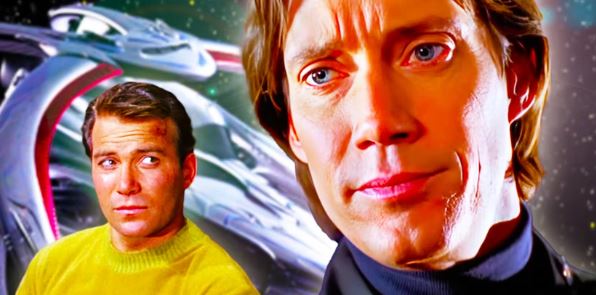Celeste Chan Wolfe, wife of Star Trek: Deep Space Nine writer Robert Hewitt Wolfe, was inadvertently responsible for the revelation that Doctor Julian Bashir (Alexander Siddig) was an Augment. DS9 season 5, episode 16, “Doctor Bashir, I Presume?” contained the game-changing twist that Bashir had undergone illegal genetic augmentation surgery when he was a child. The Federation’s ban on genetic augmentation was implemented to prevent the birth of another tyrant like Khan Noonien Singh (Ricardo Montalban). However, Bashir’s augmentations proved that not every genetic superman was a tyrant-in-waiting.
Star Trek: Deep Space Nine’s revelations about Doctor Bashir further developed the character and opened up new avenues for storytelling. Some of the best Doctor Bashir episodes of DS9 in later seasons revolved around him trying to improve the lives of other Augments, while turning down the advances of Section 31, who wanted to weaponize him against the Dominion. One of the most interesting elements of Bashir’s genetic augmentation was the lengths that he went to in order to hide them. This allowed Robert Hewitt Wolfe to address a
DS9 plothole that had always irritated his wife Celeste Chan Wolfe.

DS9’s Doctor Bashir Is An Augment Thanks To Robert Hewitt Wolfe’s Wife
“You purposely answered the question wrong.”
In Star Trek: Deep Space Nine, season 1, episode 7, “Q-Less”, written by Robert Hewitt Wolfe, Bashir reveals that he made a crucial error in his final oral exam at Starfleet Medical Academy. Julian’s error was that he mistook a pre-ganglionic fiber for a post-ganglionic nerve, which resulted in him only being the second-best student in his class. Celeste Chan Wolfe, a psychotherapist, pointed out to her husband that pre-ganglionic fibers and post-ganglionic nerves are two completely different things. When he came to write DS9 season 3, episode 19, “Distant Voices”, Wolfe wrote an apparent explanation for the inaccuracy.
ALTOVAR: But pre-ganglionic fibres and post-ganglionic nerves aren’t anything alike. Any first year medical student could tell them apart. You purposely answered the question wrong.
BASHIR: That’s ridiculous.
ALTOVAR: You didn’t want to be first in your class. You couldn’t take the pressure.
BASHIR: That’s not true.
Years later, when it was decided that Doctor Bashir was genetically enhanced, Julian’s deliberate mistake was given more meaning. Rather than being a mistake, it was, as Altovar suggested, a deliberate choice to hide his identity as a super-powered augment. Star Trek: Deep Space Nine season 5, episode 16, “Doctor Bashir, I Presume?” was written by Ronald D. Moore, who wanted to make Julian an augment to explain the inconsistencies in Doctor Bashir’s character. As the first person to point out an inconsistency in Doctor Bashir’s character, Celeste Chan Wolfe can take a small portion of the credit for the eventual revelation.
Celeste Chan Wolfe Wrote For Gene Roddenberry’s Andromeda

Robert Hewitt Wolfe left Star Trek: Deep Space Nine after season 5, to adapt Gene Roddenberry’s Andromeda concept into a TV show. Celeste Chan Wolfe, who is a screenwriter as well as a psychotherapist, submitted two story ideas for the show. Chan Wolfe is credited for the episodes “The Sum of Its Parts” and “In Heaven Now Are Three”, the teleplays of which were written by Robert Hewitt Wolfe.
Perhaps unsurprisingly, the Wolfes’ two episodes of Andromeda touch on the notion of creating life. “The Sum of Its Parts” is an episode about artificial intelligence, while “In Heaven Now Are Three” is about mythological technology that is rumored to have the power to create planets. While these are larger concepts than Doctor Bashir’s genetic enhancement storyline in Star Trek: Deep Space Nine, they all question the very nature of what it means to be human. It’s a question that modern Star Trek continues to ponder decades later.
